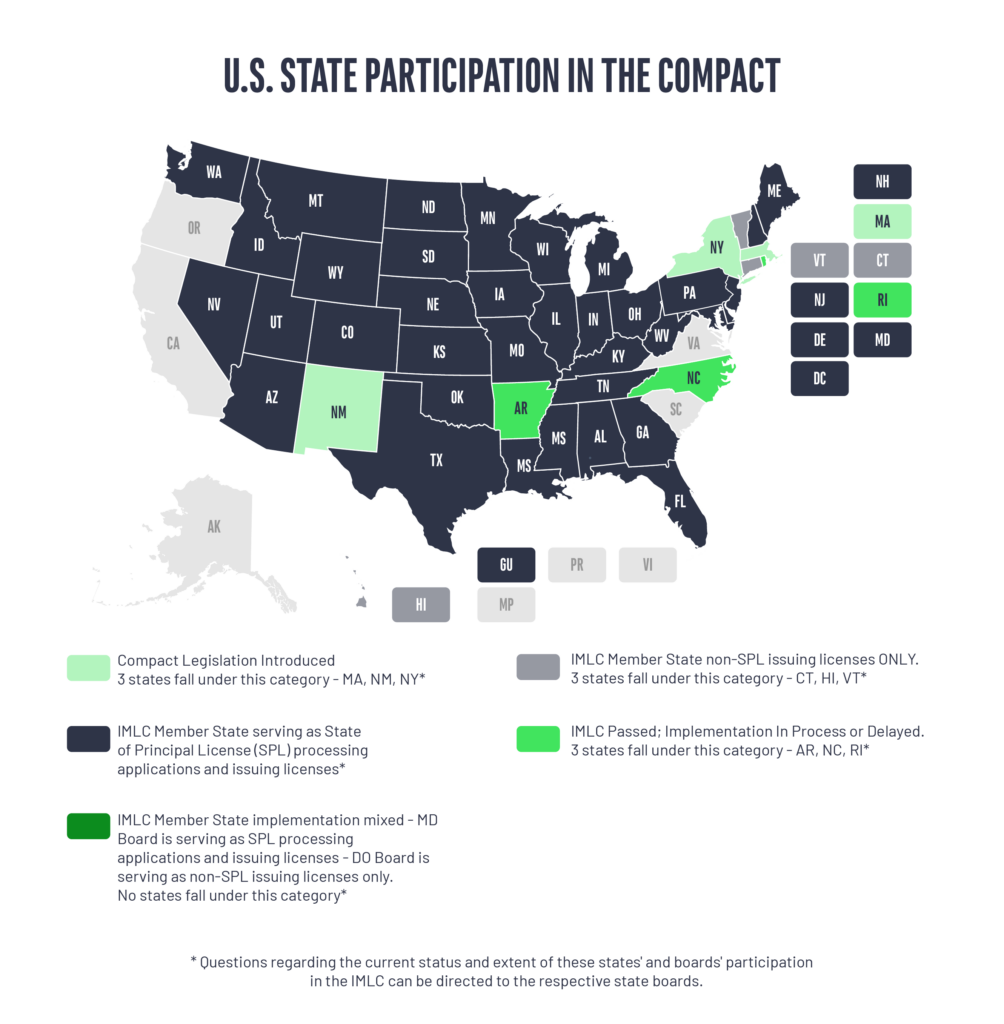The state licensing process for doctors can often feel daunting, especially if you are a travel doctor. But with the IMLC, traveling physicians can complete the licensing process for participating states in a matter of days or weeks, instead of months. Here are the answers to your most common questions about the IMLC.
1. What is the IMLC?
The Interstate Medical Licensure Compact (IMLC) is an agreement among participating states to streamline the licensing process for traveling physicians. It’s designed to help doctors pursue licensure in different states more easily, without compromising the necessary scrutiny for examining their qualifications.
2. How does the IMLC benefit locums physicians?
Physicians are able to obtain additional state licenses on a significantly shorter timeline through the IMLC. In some states, the licensing process can take six months or longer. But with the Compact, if a provider meets the requirements, the process can be cut down to a matter of days or weeks.
3. Do I need to join the IMLC to be a travel doctor?
It’s not required that you join the IMLC to work an out-of-state locum tenens assignment. but it can greatly expedite the licensing process. We recommend it for traveling physicians who are planning on working multiple out-of-state assignments. Some hospitals also prefer candidates who have an active state license or are licensed through the IMLC, so applying for the IMLC can ensure that you don’t get overlooked for travel physician jobs that you might be a good fit for.
4. How does the IMLC licensing process work?
Once a physician has been confirmed to meet the IMLC’s strict eligibility requirements, their State of Principle License (SPL) shares that information with other states participating in the compact. Providers are only required to complete one application to qualify to practice medicine in multiple states, significantly reducing the burden of obtaining multiple licenses for travel physician jobs. Visit the IMLC website to see the eligibility requirements for physicians.
5. How many states currently participate in the IMLC?
As of now, the majority of states in the U.S. are either members of the IMLC or have passed the necessary legislation and are in the process of implementation. Every state has their own licensure requirements and bylaws, and joining the IMLC requires passing new legislation, which can take time. That said, due to the increase in travel doctor jobs, there is a clear need for a faster licensing process without compromising scrutiny, so the momentum for states to join the IMLC is growing. 40 states, as well as Washington D.C. and Guam, are currently participating in the Compact.
See the full map for a list of all participating states and territories.

IMLC Member State Serving as State of Principal License (SPL)
- Alabama
- Arizona
- Colorado
- Connecticut*
- Delaware
- District of Columbia
- Florida
- Georgia
- Guam
- Hawaii*
- Idaho
- Illinois
- Indiana
- Iowa
- Kansas
- Kentucky
- Louisiana
- Maine
- Maryland
- Michigan
- Minnesota
- Mississippi
- Missouri
- Montana
- Nebraska
- Nevada
- New Hampshire
- New Jersey
- North Dakota
- Ohio
- Oklahoma
- Pennsylvania
- South Dakota
- Tennessee
- Texas
- Utah
- Vermont*
- Washington
- West Virginia
- Wisconsin
- Wyoming
*Connecticut, Hawaii, and Vermont are not currently designated as “States of Principal Licensure” (SPL). While you can obtain a license for these states through the compact if you qualify via another SPL, none of these states serve as an SPL for licensing in other states.
IMLC Passed: Implementation In Process
- Arkansas
- North Carolina
- Rhode Island
Compact Legislation Introduced
- Massachusetts
- New Mexico
- New York
Not Yet IMLC Members
- Alaska
- California
- Oregon
- South Carolina
- Virginia
This was last updated on July 7, 2025.



